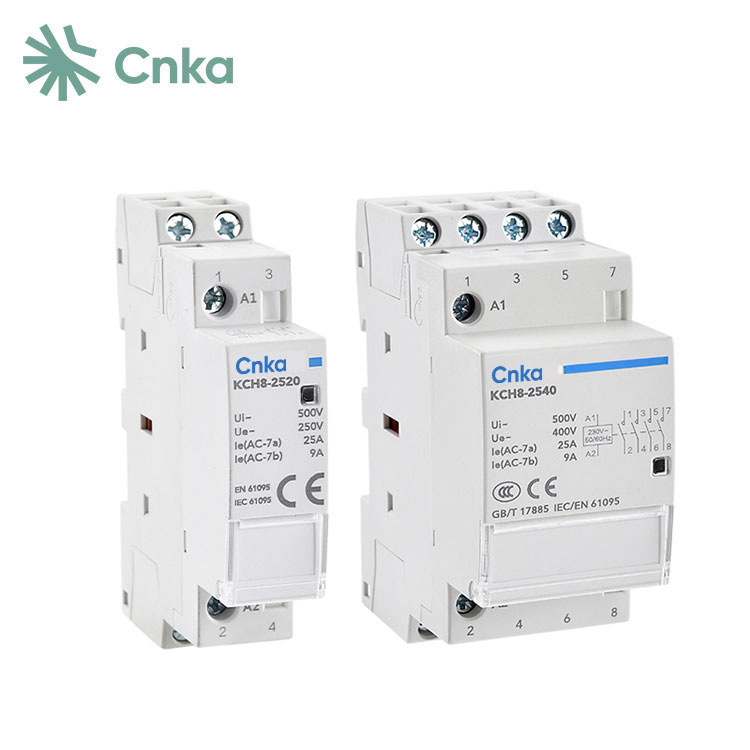AC Contactor: Essential Component in Electrical Systems
2025-05-06
In the world of electrical systems, reliability and safety are paramount. Whether it's controlling large industrial machinery, air conditioning units, or various household appliances, the ability to manage electrical circuits efficiently is crucial. One of the key components in this process is the AC contactor. This essential device plays a vital role in controlling the power supply to various electrical equipment, ensuring smooth and safe operations.

What Is an AC Contactor?
An AC contactor is an electrically controlled switch used for switching an electrical circuit on or off. It is typically used to control electric motors, lighting, heating, and air conditioning systems, where large currents need to be switched on and off automatically. The contactor operates by using an electromagnet to pull contacts together, thus completing the circuit and allowing electrical flow.
Unlike traditional manual switches, which are often unsuitable for high-power applications, AC contactors can handle much higher currents and voltages, making them ideal for industrial and commercial environments.
How Does an AC Contactor Work?
The operation of an AC contactor can be broken down into a few key steps:
1. Electromagnetic Coil
At the core of the contactor is an electromagnetic coil. When electrical current is supplied to the coil, it generates a magnetic field.
2. Pulling the Contacts Together
This magnetic field pulls a set of movable contacts into position, closing the circuit and allowing electricity to flow through it. This process is called "energizing" the contactor.
3. Breaking the Circuit
When the electrical supply to the coil is turned off, the magnetic field dissipates, and the contacts return to their original position. This breaks the circuit and stops the flow of electricity, effectively turning off the connected device.
4. Mechanical Structure
AC contactors are built with multiple sets of contacts: a "normally open" set that remains open when the contactor is not energized and a "normally closed" set that remains closed. These contacts are designed for high durability, ensuring the contactor can handle frequent switching operations.
Types of AC Contactors
AC contactors come in different types and sizes depending on their application. Here are the main types:
1. Single-Phase Contactors
These are designed for residential and light commercial applications where only a single-phase supply is needed. They are commonly used to control smaller devices, such as water heaters or HVAC systems.
2. Three-Phase Contactors
More common in industrial and commercial environments, these contactors are designed to handle three-phase electrical systems, which provide more power. They are used to control large machinery, pumps, and heavy-duty electrical equipment.
3. Magnetic Contactors
Magnetic contactors are the most commonly used type, relying on an electromagnetic coil to close the contacts. They are highly reliable and efficient, capable of handling both low and high current loads.
4. Auxiliary Contactors
These contactors are often used in combination with a primary contactor. They provide additional switching capabilities, such as controlling auxiliary circuits or signaling devices, for complex control systems.
Applications of AC Contactors
AC contactors are used in various applications, both in residential and industrial environments. Some of the most common applications include:
1. Industrial Machinery
In industrial settings, AC contactors are used to control motors, pumps, conveyors, and other heavy machinery. By switching large electrical loads on and off, they ensure that the machinery operates smoothly and efficiently.
2. HVAC Systems
Air conditioning units and heating systems rely on AC contactors to control the flow of electricity to compressors, fans, and other components. This enables the systems to be turned on or off remotely without the need for manual intervention.
3. Lighting Control
AC contactors are also commonly used for lighting control in large commercial or industrial buildings. They allow for the centralized control of lighting circuits, turning lights on or off in different areas based on needs or time schedules.
4. Power Distribution Systems
In power distribution systems, AC contactors are used to control the connection and disconnection of electrical circuits. This includes large power grids or backup generators, where quick and reliable switching is crucial.
5. Water Treatment Plants
AC contactors help manage the electrical systems of water treatment plants by controlling pumps and motors. These plants rely on efficient water movement and filtration processes, which require precise electrical management.
Advantages of AC Contactors
1. Reliability and Durability
AC contactors are designed to be highly durable, capable of handling frequent switching cycles without failure. This reliability makes them ideal for critical applications where consistent performance is essential.
2. Energy Efficiency
By using an AC contactor to control large electrical loads, energy consumption can be optimized. The contactor allows for efficient power control, reducing waste and improving overall energy efficiency in systems like HVAC, lighting, and industrial machinery.
3. Safety
AC contactors are designed with safety in mind. They ensure that electrical equipment can be operated remotely and automatically, reducing the risk of accidents from manual switching. Additionally, contactors have built-in protection against short circuits and overloads.
4. Remote Operation
The ability to control electrical circuits remotely is a key advantage of AC contactors. They can be operated through control panels or connected to automated systems, making it easier to manage electrical equipment without manual intervention.
5. Cost-Effective
Compared to other switching devices, AC contactors are relatively affordable. Their long lifespan and low maintenance needs make them a cost-effective solution for a wide range of applications.
Conclusion
AC contactors are indispensable in modern electrical systems, offering reliable, efficient, and safe control of electrical circuits. From residential applications to large-scale industrial operations, AC contactors provide essential functionality for a range of equipment, ensuring smooth and safe operations. With their ability to handle high currents, ease of remote operation, and durability, AC contactors will continue to be a key component in the electrical industry for years to come.


